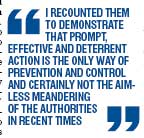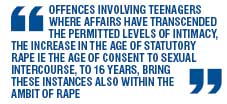 Sexual violence and child abuse are abhorrent crimes that evoke the righteous indignation of the people. The media should be commended for giving due publicity to the more serious instances which would galvanise public opinion against the alarming rise of these crimes. Such action is necessary in the face of apathy on the part of the authorities who follow an ostrich policy of denying any rise in the wave of crime and act in a manner which resonates with that of Nero in the waning days of the Roman empire.
Sexual violence and child abuse are abhorrent crimes that evoke the righteous indignation of the people. The media should be commended for giving due publicity to the more serious instances which would galvanise public opinion against the alarming rise of these crimes. Such action is necessary in the face of apathy on the part of the authorities who follow an ostrich policy of denying any rise in the wave of crime and act in a manner which resonates with that of Nero in the waning days of the Roman empire.
But the President has adopted a slightly different attitude as reported in the Daily Mirror of July 11. He has stated that “all members of the SLFP who have been accused of rape and child abuse would be suspended from the party and not allowed to contest any election.” There is of course nothing to prevent a “Mervyn Silva” type of inquiry being held and the victim being found guilty of provoking the rapist! Hence more pressure has to be used, now to galvanise the authorities into action.
In the mid 1990s the then government took legislative and administrative action to combat sexual violence and child abuse. Extensive amendments were made to the Penal Code by Act No 22 of 1995 which included an amendment to the offence of rape and creation of new offences of incest, sexual harassment, grave sexual abuse and the like. Punishments were significantly increased. The key amendment to the offence of rape was an increase in the age of statutory rape where consent of the victim is not a defence. Previously the age of consent was 12 years which was increased to 16 years. By Act No 50 of 1998 the National Child Protection Authority (NCPA) was established to deal with offences of child abuse to which an expanded definition was given. Any person below the age of 18 considered to be a child in terms of the Act. Authorised officers of the NCPA are deemed to be peace officers which enable them to exercise police powers in investigating and prosecuting these offences. Thus a fairly well knit legal regime was established to combat this social menace.
Professor Harendra Silva who functioned as Chairman of the NCPA for several years rendered yeoman service in enhancing public awareness of the legal provisions and by taking prompt and effective action to enforce them.
Regrettably, the thrust and momentum in fighting this menace has not been maintained. On the contrary authorities appear to have gone on reverse gear. A charge of rape pending in the High Court against a Member of Parliament was withdrawn by the Attorney General. The MP was later involved in a multiple murder at Wellampitiya and was whisked away to a foreign country and placed beyond the jurisdiction of our courts. The conduct of the AG and the authorities sent a tremendously damaging negative signal that this breed of people viz politicians in power enjoy an impunity in respect of such crime. Last year, a Chairman of a local authority in Tangalle, in status the first citizen of the area, was involved in a gruesome incident of the rape of a tourist and the murder of her companion. Two weeks ago the Chairman of the Akuressa local authority was involved in the rape of a 13 year old girl. An offence allegedly committed in his guest house. The Inspector General of Police (IGP) has gone on record saying that the political killer Julampitiye Amare was wanted in respect of committing rape. And, he was free to roam around armed with an automatic weapon until there was a public outcry which made him to ceremoniously surrender to court. Thus, the lower minions who support those in power have had a field day of enjoying an impunity.
 In 1995 there were 195 cases of rape in respect of children. This figure increased to 1169 in 2011. In the first six months of this year 900 cases of rape have been reported of which 700 relate to children. The grim picture that emerges from the single instances recounted and figure intoto is that, there has been a serious breakdown in the legal machinery in combating such crimes, for that matter all crime, which should be addressed from a national perspective transcending partisans politics.
In 1995 there were 195 cases of rape in respect of children. This figure increased to 1169 in 2011. In the first six months of this year 900 cases of rape have been reported of which 700 relate to children. The grim picture that emerges from the single instances recounted and figure intoto is that, there has been a serious breakdown in the legal machinery in combating such crimes, for that matter all crime, which should be addressed from a national perspective transcending partisans politics.
Circumstantially, these offences fall into three broad categories, each requiring a different strategy in combating it.
Offences committed by persons in authority and criminal elements prone to violence. Offences of incest as defined in section 364 A of the Penal Code introduced by the 1995 Amendment, committed by a parent or a relative coming within the comprehensive definition in the section . Offences involving teenagers where affairs have transcended the permitted levels of intimacy, The increase in the age of statutory rape ie the age of consent to sexual intercourse, to 16 years, bring these instances also within the ambit of rape.
In 1997 sometime after the Government forces retrieved the Jaffna Peninsula from the LTTE, Chrishanti Kumaraswamy a school girl returning after sitting for an examination was raped and murdered at an Army checkpoint. Three relatives who went in search were also murdered and the bodies were buried. There was a huge public outcry and as Attorney General I received indignant complaints of prominent Tamil lawyers and politicians who alleged that Jaffna was safer under the control of the LTTE. I assured them that prompt and effective action would be taken to bring the offenders to the justice. A quick and thorough investigation led to the arrest of the Army personnel involved. That was the first case in which I recommended to the Chief Justice that the accused be brought before a trial at bar, which was allowed. After an expeditious trial they were found guilty of murder and rape. But,  Rajapaksa the principal accused in the case sprang a surprise on us. The law allows a convict to make a statement before the sentence of death is pronounced on him. Rajapaksa stated that he was falsely implicated because the Army had carried out mass executions of Tamil persons whose bodies were buried in secret locations and that he was privy to that information. It was like falling from the frying fan in to the fire. Now, there were demands internationally for investigations into alleged mass executions. Lakshman Kadirgamar, the Minister of Foreign Affairs took control of the situation. I remember meetings in his office attended by the Commander of Army and other top officers that were convened to strategise a response. I was reluctant to seek a judicial inquiry but Lakshman strongly advised that it should be done, which was accepted. The Judicial Service Commission (JSC) appointed a judicial officer to hold the inquiry. We invited a British forensic specialist to be present to pool expertise and to ensure that there are no allegations of suppression. Rajapaksa was allowed to point to any place he pleased and the excavation in the Chemmani area went on for months. Finally his allegation of mass burials were proved to be false. I diverted somewhat to recount these events to show that there are different ways to respond to allegations and Lakshman’s honest and upright response was wise.
Rajapaksa the principal accused in the case sprang a surprise on us. The law allows a convict to make a statement before the sentence of death is pronounced on him. Rajapaksa stated that he was falsely implicated because the Army had carried out mass executions of Tamil persons whose bodies were buried in secret locations and that he was privy to that information. It was like falling from the frying fan in to the fire. Now, there were demands internationally for investigations into alleged mass executions. Lakshman Kadirgamar, the Minister of Foreign Affairs took control of the situation. I remember meetings in his office attended by the Commander of Army and other top officers that were convened to strategise a response. I was reluctant to seek a judicial inquiry but Lakshman strongly advised that it should be done, which was accepted. The Judicial Service Commission (JSC) appointed a judicial officer to hold the inquiry. We invited a British forensic specialist to be present to pool expertise and to ensure that there are no allegations of suppression. Rajapaksa was allowed to point to any place he pleased and the excavation in the Chemmani area went on for months. Finally his allegation of mass burials were proved to be false. I diverted somewhat to recount these events to show that there are different ways to respond to allegations and Lakshman’s honest and upright response was wise.
Whilst the foregoing events were unfolding Rita John, an Indian national recently wedded to a Sri Lankan was raped and murdered in the Mutwal area. The same course of prompt action was taken and Kondey Ajith and his gang were sentenced to death at a trial at bar. The government announced that the death sentence will be carried out and I sat on a committee that recommended the guidelines to be followed. Although the then President stopped short of taking a final decision on the matter, deterrent action had the desired effect and the wave of sexual violence abated.
 These incidents came within the first category and I recounted them to demonstrate that prompt, effective and deterrent action is the only way of prevention and control and certainly not the aimless meandering of the authorities in recent times.
These incidents came within the first category and I recounted them to demonstrate that prompt, effective and deterrent action is the only way of prevention and control and certainly not the aimless meandering of the authorities in recent times.
The second category is that of incest where rape or abuse is committed by a parent or other relative. Nearly 50 % of the offences concerning children come within this category, This phenomenon has resulted almost entirely from mothers leaving for employment abroad. The Central Bank boasts of foreign remittances amounting to five billion U.S. dollars but these incidents constitute the social price we pay. A father who received remittances from abroad spends most of it on liquor and unleashes his sexual passions on his children. Here judicial proceedings are traumatic. The child has to testify against the parent or relative and at times incarceration of the offender, deprives the child of whatever little protection which was there. Article 27 (13) of the Constitution lays down as a directive principle of State policy that “the State shall promote with special care the interests of children and youth and … protect them from exploitation and discrimination”. Hence it is the bounden duty of the government to implement special programmes at local level to identify the vulnerable children and to take necessary preventive action. I recall in particular that the High Court Judge of Embilipitiya who was deeply perturbed by the prevalence of such incidents in the area ogranised a seminar of all officials who have access to homes ie Family Health Workers, Grama Seva Officers, Health officials and the Police. As Chief Justice I was invited to address the seminar. Our focus was to devise coordinated programmes to identify vulnerable children and to take preventive action. Deterrent punishment may not be the answer in this instance.
 The third category of teenage affairs that transcend the limits of permitted intimacy have resulted from a variety of causes that may include free access to pornographic material and the space provided by mixed education and mushrooming tuition classes. The phenomenon has to be dealt with by well structured educational programmes. There may be studies done in developed countries which could be availed of. Deterrent punishment may be senseless in this instance.
The third category of teenage affairs that transcend the limits of permitted intimacy have resulted from a variety of causes that may include free access to pornographic material and the space provided by mixed education and mushrooming tuition classes. The phenomenon has to be dealt with by well structured educational programmes. There may be studies done in developed countries which could be availed of. Deterrent punishment may be senseless in this instance.
As outlined in this article different categories of offences call for different coordinated responses. There is no single line of cure. But, the single predominant concern should be the level of victim care and protection, the absence of which is starkly brought to focus in the lead news item of the Daily Mirror of July 13 which reports that a girl who was a victim of rape was in turn raped by a Police sergeant who was assigned to investigate the offence. It is necessary that the Police have specially trained officers to investigate these offences without unleashing sex starved brutes on hapless victims. Often victims are traumatised once again on being required to testify in male dominated proceedings which should be avoided. There should be counselling and the award of suitable compensation all of which require coordinated programmes of action on the part of the State.